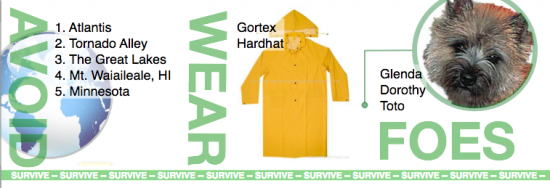Survival guides have some interesting potential for a variety of historical and literary analysis needs. This idea was jump started by the Brighid Survival Manual which was found via Super Punch.
Here’s a quick example for the Witch in The Wizard of Oz.
I’ll see if time allows me to make one for a Jamestown colonist. The problem is that these take a good bit of time and effort if they’re going to be good. That’s great in a project but it does make it harder on me.
Anyway, lots of English and history applications. It’d be fun to write survival guides for self-destructive historical or literary figures- maybe Edgar Allen Poe or Custard.



This is yet another great way to move past our traditional methods of teaching and embrace the digital age. I have been teaching social studies for some time and at some point in the year, students always make a brochure, but this is much cooler. Thanks!